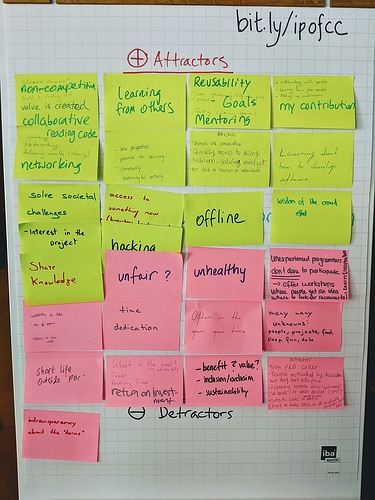DINAcon 2018 is one month away, and with it our morning session In pursuit of fair co-creation where Gonzalo Casas, Reto Wick and I will address the issues of modern hackathons - followed by, of course, another Hacknight! Check out my (our?) reading list, send in any questions or suggestions here, then join us for the conference and after-partyhackathon!
Now live:
Submit your open source projects during the month ahead to get them announced and worked on by participants of the upcoming DINAcon conference! And if you’d like to join in and help us prepare, just connect to our open source team chat server via the Community link on the top of that page.
And remember, it’s people in a room to have fun together in a slightly unconventional way. Make sure that you build up the community and teamwork of it all the way through, look after everyone, go have beers after, and start planning the next one if people are asking for it!
– jeffbr13 on May 15, 2015 (Hacker News)
Mood: super happy and excited about how our session on Friday should go about ![]()
![]()
![]()
![]()
In pursuit of fair co-creation was a workshop facilitated by Gonzalo Casas, Oleg Lavrovsky & Reto Wick on October 19 in Bern. Slides from our DINAcon 2018 session are available. See also our literature list.
Outline of topics
- How do you decide what hackathon to join?
- Ask every participant to share an event they are planning to go to and/or have been at.
- Bring a stack of Green and Red Post-Its for people to suggest “attractors” and “detractors”, that we’ll use in the Flowchart later on.
- Let’s define our scope
- “subject” -> hackathon
- (informal, neologism) An event where programmers and others meet for collaborative software development.
- “predicate” -> exploitation
- Borrowed from French exploitation, from exploiter (“exploit”), from Latin explicō (“unfold, deploy”).
- “object” -> precarization
- (sociology) a condition of existence without predictability or security, affecting material or psychological welfare.
- “subject” -> hackathon
- Share relevant projects
-
Online platforms
- See Mechanism for hackathon discoverability in DRIBDAT (see Whitepaper) and MakeZurich repo (2018)
- Research projects
-
Reading club
- We will print copies of a card with the link to our literature list, in the style of the Make badge.
-
Online platforms
- Lens / perspectives
-
Role of the challenger
- Alignment of the expectations is critical between the organizing team and the challengers/experts/sponsors who take a initiating or guiding or managing role.
- A recurrent source of friction is challengers who miss the point or are underwhelmed with the hackathon.
-
Role of the participant
- Finding people you can work with is generally hard, the hackathon is team building on jet fuel.
- Matching everyone’s expectations is hard, and guidelines can help.
- We do not have many established tools and techniques for being effective during a hackathon.
-
Role of the infrastructure
- What tools help us to make sure we build confidence in hackathons.
- From pomodoro techniques, to build boxes, to data resources, to network and computing infrastructure, to environmental design.
-
Role of the challenger
- Next steps
-
Join the Hacknight, or another hackathon
- hacknight.dinacon.ch
- hack.opendata.ch
- makezurich.ch
- …start your own!
-
Help make a Flowchart
- In a playful way our discussion should help to together define the criteria that will enable the discoverability thinking that will be part of Dribdat, etc.
- As the “take home” part of the workshop, each participant who leaves us their postal address will get a nicely printed poster first edition, and possibly chocolate
;-)
- Join the online discussion
-
Join the Hacknight, or another hackathon
